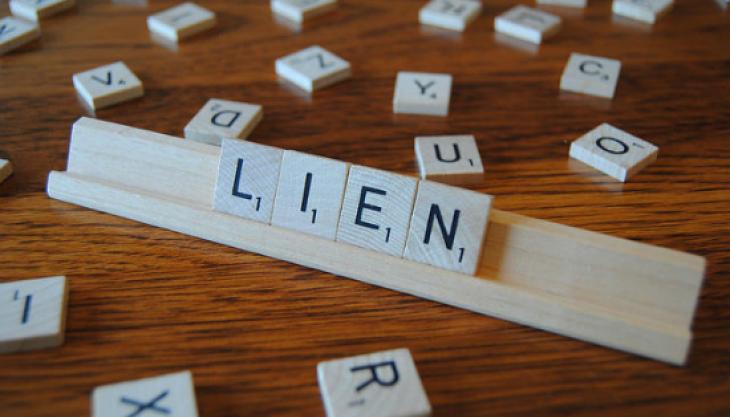What Happens to Liens during Chapter 7 Bankruptcy in North Carolina?
Submitted by Rachel R on Mon, 06/20/2016 - 10:11am

Find out how bankruptcy can help deal with liens
Image Source: Flickr CC User GotCredit
Liens can come as a result of an agreement when you purchase an asset – such as a home or auto – and they can also result from a lawsuit judgment. But what happens if you file Chapter 7 bankruptcy in North Carolina? Do those liens survive? The answer is – it depends.
What Exactly Is a Lien?
A lien represents an interest that someone (usually a finance company) has in an asset that you possess. For instance, when you purchase a house and take out a mortgage to pay for the house, the mortgage lender takes out a lien against the property. The lien prevents you from selling the house without repaying what you owe to the lien-holder.
In the case of a mortgage, say you have a house worth $180k and a mortgage balance of $150k. When you sell the home for the fair market value, you have to pay the lender $150k to get them to release the lien to the new owner. Without the lien release, the sale can’t go through. But other sources besides a lender can place a lien on your asset.
Who Can Place a Lien on Your Property?
Anyone with a legal claim against an asset you own can pursue a lien. In most cases, a judgment must be issued first and then the lien will be attached to the asset. The IRS, however, can place a lien on your property without suing you. For instance, if you owe back taxes, the IRS may place a lien on your house. That way, if you sell the home and there is equity, they can take that to the extent you owe them.
So, if a $180k home with a $150k mortgage and $20k IRS lien is sold, you would only walk away with $10k. If the tax lien is $30k or more, you would leave with nothing to show for the sale of your home. Liens have the power to keep money out of your hand and block the sale of your assets. This can make life hard, particularly if money is tight and you need to sell because you can’t make payments.
Does Chapter 7 Bankruptcy Get Rid of Liens?
Chapter 7 bankruptcy can wipe out the debt associated with a lien, but you have to take an extra step to wipe out the lien as well – and it may not be possible in all cases. This step is called “lien avoidance."
You must meet three conditions to avoid a lien:
- The lien comes from a money judgment issued by the court. In other words, it's the result of a situation in which you were sued, there was a judgment against you, and the creditor then obtained a lien against your vehicle or home.
- You must be entitled to claim an exemption for some of the equity in your property. For instance, you own your vehicle free and clear and have an exemption to cover the fair value of the car.
- The lien would cause you to lose some or all of the equity. For instance, your car is worth $3,500 and you can exempt that amount – but the lien is for $3,000, so you would lose most of your equity.
If the lien meets these qualifications, your North Carolina bankruptcy attorney should be able to avoid the lien as part of your bankruptcy case. But the better alternative is to not get hit by a creditor lien at all. If you’re being sued by creditors, filing Chapter 7 should put a stop to that so that a judgment isn’t issued and no liens are applied to your property.
To find out more about how Chapter 7 bankruptcy can help you get rid of debt you can’t afford and protect your assets from liens, contact the Law Offices of John T Orcutt. Call +1-833-627-0115 now for a free North Carolina bankruptcy consultation at one of our locations in Raleigh, Durham, Fayetteville, Wilson, Greensboro or Wilmington.
Debts Hurt! Got debt? Need help? Get started below!
Serving All of North Carolina
- Bankruptcy Attorneys Raleigh NC (North)
- Bankruptcy Attorney Fayetteville NC
- Bankruptcy Attorney Durham NC
- Bankruptcy Attorneys Wilson NC
- Bankruptcy Attorneys Greensboro NC
- Bankruptcy Attorneys Southport NC
- Bankruptcy Attorneys Wilmington NC
Bankruptcy Attorneys Raleigh NC (North)
6616 Six Forks Rd #203 Raleigh, NC 27615 North Carolina
Tel: (919) 847-9750

Bankruptcy Attorney Fayetteville NC
2711 Breezewood Ave Fayetteville, NC 28303 North Carolina
Tel: (910) 323-2972

Bankruptcy Attorney Durham NC
1738 Hillandale Rd Suite D Durham, NC 27705 North Carolina
Tel: (919) 286-1695


Bankruptcy Attorneys Greensboro NC
2100 W Cornwallis Dr. STE O Greensboro, NC 27408 North Carolina
Tel: (336) 542-5993

Bankruptcy Attorneys Southport NC
116 N Howe St. Suite A Southport, NC 28461 North Carolina
Tel: (910) 218-8682

Bankruptcy Attorneys Wilmington NC
116 N. Howe Street, Suite A Southport, NC 28461 North Carolina
Tel: (910) 447-2987
